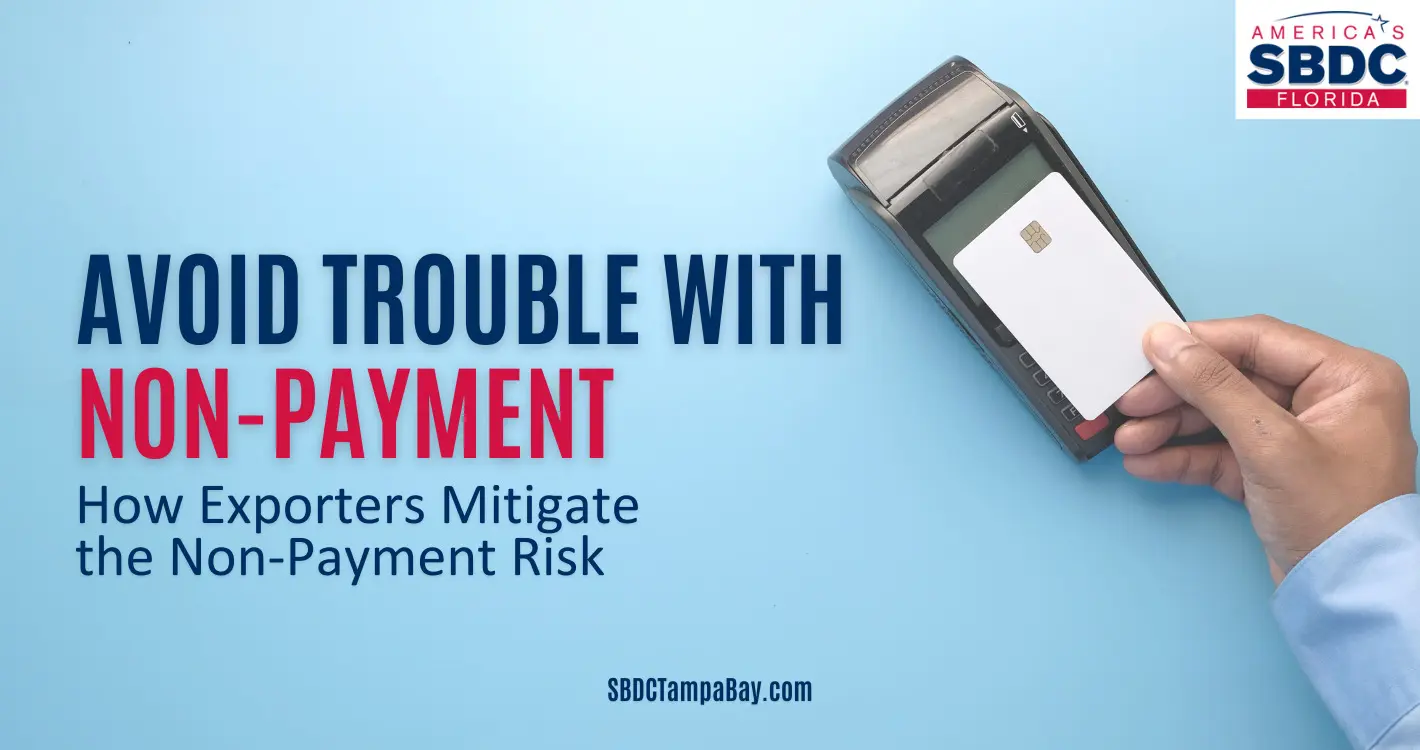Avoid Trouble with Non-payment by Insuring Your Foreign Receivables
by Selma Canas, CGBP | November 13, 2022
Exporters often require pre-payment of goods as a way to mitigate the risk of non-payment by the buyer. Pre-payment certainly does ensure the exporter against revenue loss if the buyer is willing to do so. The buyer would have to agree to pay-up-front and wait for the goods to arrive, risking non-receipt of the goods. The exporter and the buyer both have risk when conducting international transactions and therefore, need to find the best way to mitigate these risks.
For exporters, offering credit terms may be scary since the buyer may not pay. This is especially true for smaller companies and for those where 80 percent of their sales come from 20 percent of their customers.
If a buyer does not make payment, it can be devastating for the exporter’s business. On the other hand, offering credit terms can help exporters grow faster, become more competitive, and increase sales. The more credit a company offers, the more goods a buyer will purchase due to having more cash flow.
Exporters can mitigate the non-payment risk by purchasing credit insurance on their foreign receivables. The Export-Import Bank of the US (EXIM) is the official export credit agency of the United States, providing some of the best rates for U.S. exporters.
Private companies include Coface For Trade and Allianz Trade, to name a few. Not only do these companies offer credit insurance, they also provide financial portfolios for customers and countries, helping the exporter with due diligence. They are, in fact, a valuable resource for credit information worldwide.
Credit insurance works in the same way as other types of insurance. The exporter purchases insurance coverage based on their specific needs. The coverage could be for the exporters’ entire portfolio of business or for a single customer in a specific country. Coverage insures against non-payment due to commercial or political risk, so if there is civil unrest or war in a country where you export, it may be prudent to carry credit insurance in those countries.
If non-payment does occur, the exporter would file a claim with their insurer, which would then make payment on that invoice up to 95 percent, on average. The insurer would use their resources to collect the debt from the buyer. Basically, all of the costs associated with the transaction will be recouped by the exporter since 5 to 10 percent is more than likely, the profit margin.
The rates vary depending on the type of insurance and amount of receivables, among other factors. However, credit insurance will offset its cost to an exporter by increasing sales and becoming more competitive just for having it. Credit insurance also puts the exporter in a better borrowing position for bank loans. Insured receivables can be used as collateral to access additional capital, helping sustain a company’s operations while awaiting payments from buyers.
Credit insurance gives the exporter the confidence to offer credit terms to more buyers around the world, thereby, gaining competitive advantage and increasing sales while controlling non-payment risk.






Selma Canas
Canas, Consultants, International Consultants 2, TampaNASBITE Certified Global Business Professional (CGBP), Florida SBDC at USF, Tamp
Specialties: International Trade, Export Marketing Plans, Market Research
Selma Canas is responsible for guiding small businesses through the complexities of developing export marketing and international expansion plans and teaching seminars on basic international trade. She has developed more than 30 Export Marketing Plans during the past six years for local businesses, and participated in trade missions to Brazil, Chile, Canada, and the Dominican Republic. Canas has more than 15 years of experience in sales, marketing and customer service in a variety of industries, including freight forwarding, real estate and advertising. As a co-owner of Restaurant Guide USA, she increased sales and distribution points and tripled the size of the distributed product.
As a real estate broker-owner, Canas carved a niche in the Latin American community and had a career sales volume of more than $37 million. Canas earned her bachelor degree in economics from the University of South Florida. She is a NASBITE Certified Global Business Professional and holds an Export and Trade Counseling Certification from the U.S. Small Business Association. Selma earned Florida SBDC at USF Employee of the Year honors in 2016. She is a member of Toastmasters international and is fluent in Spanish and Portuguese.